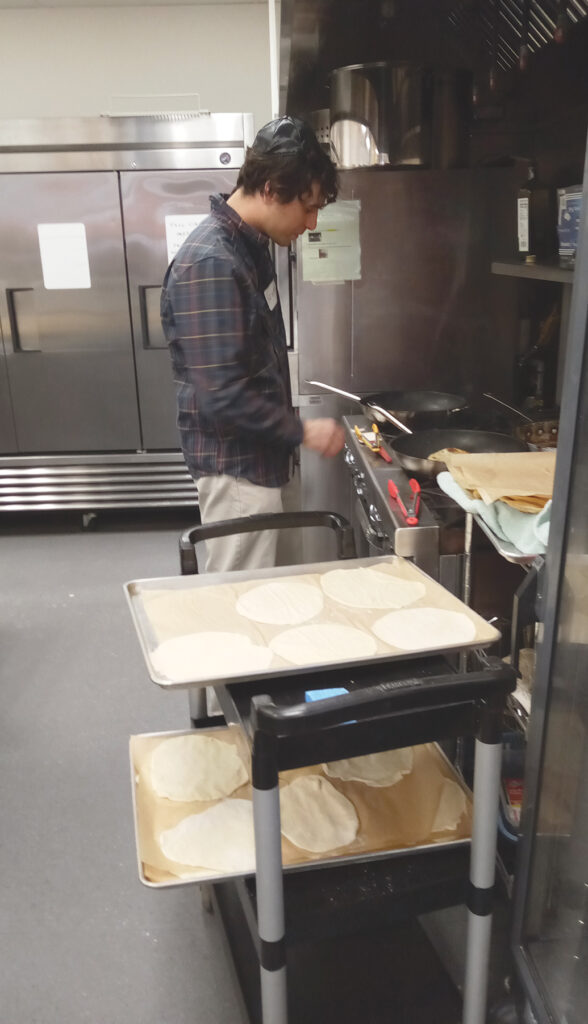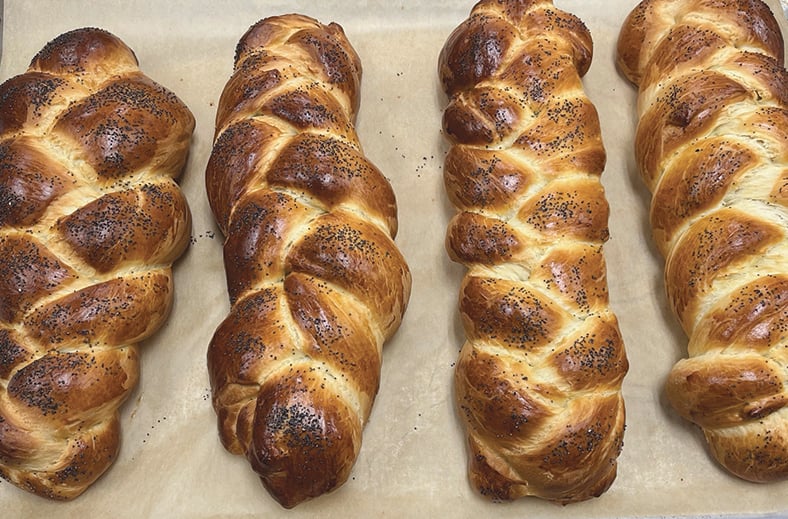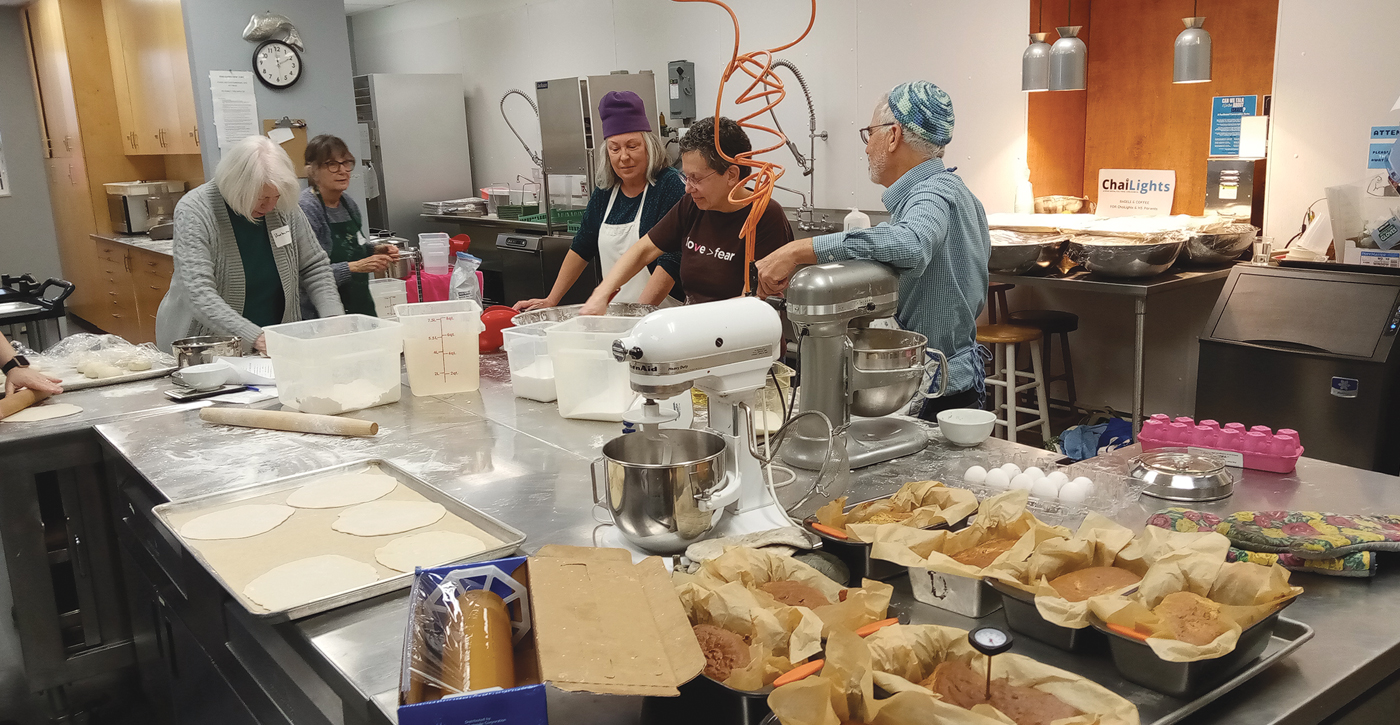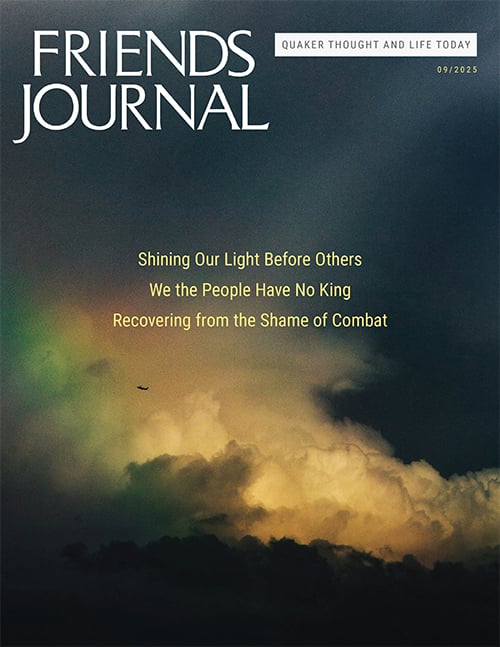A Synagogue and a Meeting Share a Mission for Peace
Outdoors, snow stood two feet deep and the temperature hung stubbornly in the teens. Indoors, the nostalgic warmth and aromas of baking bread filled the kitchen of Ohavi Zedek (OZ) synagogue, across a residential street from the quarters of Burlington (Vt.) Friends Meeting (BFM). Bread for Peace was in full swing on that gray Sunday afternoon, proceeds from the sales of its culinary creations to go equally to one Israeli and one Palestinian humanitarian aid organization.
Burlington’s Bread for Peace was conceived by the Conservative synagogue’s Scott Silverstein, who launched the project shortly after the current war began in October 2023. “I was grief-stricken and desperate to make some positive gesture,” he says. The project grew, and in January 2025, he asked the neighboring Friends meeting if they would care to join. Upon deliberation, they readily agreed.

Teaming with BFM’s liaison Catherine Bock, Silverstein has a hand in every stage, including recruiting volunteers; advertising to the general public; fulfilling orders at three pickup sites, one of which is his own house; and overseeing two of the three recipes, challah and pita. He keeps track of orders and pantry supplies, and, with Jeff Potash, the synagogue’s president and, in Silverstein’s words, “unofficial kitchen manager,” makes sure the necessary ingredients and packaging supplies are procured.
“On bake day I’m in the kitchen from beginning to end to greet volunteers, assign tasks, troubleshoot, make sure we bake the right amount, and fill in with the hands-on work as much as I can,” Silverstein explains, regarding the six-hour work sessions. Most volunteers sign up for two-hour shifts. Once the loaves are baked, cooled, and bagged, Silverstein distributes them to the pickup locations. “If we overbake, we try to sell the extras, or donate them to food pantries,” he says.
And so it is that on one Sunday a month from noon to 6:00 p.m., volunteers from the two congregations assemble at their appointed times at the synagogue school’s well-equipped kitchen. Side by side, Jews and Quakers make dough for challah, pita, and gluten-free oat bread, kneading it, rolling it, shaping it, and sliding it into industrial-size ovens. Conversation ranges from the serious (the state of the Middle East, and of the world in the wake of the 2024 U.S. elections) to the frivolous (“that flour looks good on you!”).
For her part, BFM’s Bock is also a multitasker, supervising the baking of the breads and the braiding of the challah. “I keep my eyes on the whole kitchen to make sure everyone has a job to do and feels at home, and I jump in when someone needs extra help.”
Bock recognizes the project’s opportunity for connection. She believes it’s important that neighbors get to know each other, “especially neighboring congregations who may not agree politically. I see it as a way for people to meet by working together and having fun baking. But aside from the fun, I’ve seen that people yearn for a way to be helpful without having to argue about political views. They yearn for community.”
Evan Rose, OZ’s program and engagement manager, designed print and digital marketing materials and administers the online forms for purchases and volunteer sign-ups. He agrees that the project builds community: “It’s a great event in the name of peace. Coming together for the greater good and to embrace the qualities of baking and community is a very practical and, dare I say it, fun way to unite people with different viewpoints.”
BFM member Lynne Silva says she has enjoyed working with “this interfaith group of caring people who are building peaceful community.” She sees value in having a shared activity and mission. “As it turns out, it is actually possible to have meaningful discussions while wrestling with huge blobs of dough. And as each baking afternoon has come to an end, with 75 pounds of flour transformed into dozens of loaves of bread, I have been grateful that our efforts will help ease the suffering in both Palestine and Israel.”

Silverstein affirms that he is “both pro-Israel and pro-Palestine,” and calls Israel his ancestral and spiritual home. “As a Jewish person, I have long understood Israel’s existence as critical to my safety and religious freedom, ensuring that 2,000 years of collective trauma cannot happen again. As an adult, I have increasingly listened to Palestinian stories and appreciated their inalienable claim to the same land. Bread for Peace aims to find a shred of common ground—care and concern for all humanity—and then do something productive with it.”
Perhaps as a microcosm of the tensions in the Middle East, that expansive view is not unanimous. According to Silverstein, one OZ member was upset based on a suspicion that the Palestinian recipient, Palestine Children’s Relief Fund (PCRF), was a front for Hamas. “We responded by sending that person a variety of sources indicating that PCRF donations do not go to Hamas. We do not plan on changing the charities we support,” Silverstein says.
Silverstein didn’t initially aim to bring together people with different perspectives. “But partnering with BFM has given me hope that even in this intensely emotional conflict we can hear and validate each other’s understanding. The more we cross-pollinate, the better we realize that the caricatures are not true—most Israel supporters are extremely critical of the Netanyahu and Trump administrations, just as most Palestine supporters are disgusted with Hamas and have no ill will toward Jews—and the closer we’ll get to a unified vision for peace. The first step is seeing each other as fellow humans, as friends and partners. I value this opportunity to show folks we are closer than we appear.”
As spring finally crept into northern Vermont, synagogue and meetinghouse together committed themselves to continuing the monthly sessions indefinitely, and to inviting other Burlington-area congregations, including another synagogue and a mosque, to join. This year, through July’s bake, Bread for Peace had filled enough orders to donate almost $3,300 each to PCRF and United Hatzalah of Israel.
According to United Hatzalah’s website, among its numerous initiatives the organization trains and places Israeli widows in emergency medicine and provides regular medical checkups to elderly individuals living alone, focusing especially on Holocaust survivors. PCRF’s site reports that it has distributed fresh produce baskets to displaced families in Gaza and launched a life-saving kidney transplant mission at the Palestine Medical Complex in the West Bank.
And what has been the response of the bread purchasers? “I really appreciate the opportunity to participate in an effort that identifies the humanitarian needs on both sides and seeks to promote peace above all,” said one, echoing several others.
“Ohavi Zedek” means “lovers of justice” in Hebrew. It’s a position on which the congregations of the eponymous synagogue and Burlington Friends Meeting can heartily unite.





It’s heartening to read about this interfaith collaboration that builds community, conversation, and understanding, while supporting the humanitarian needs of people on both “sides” of a conflict.